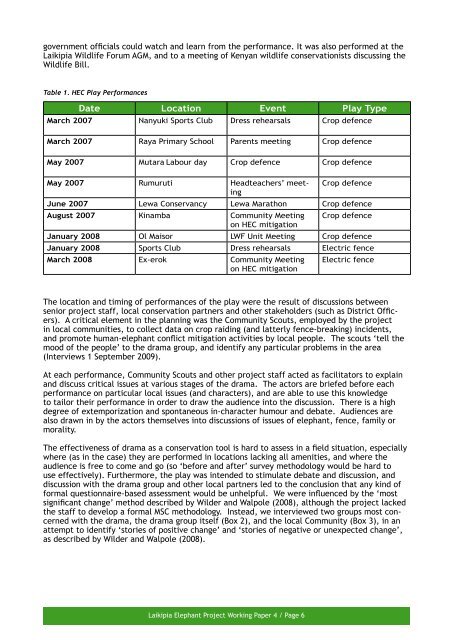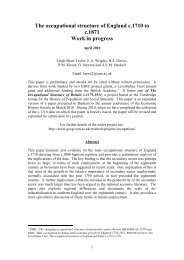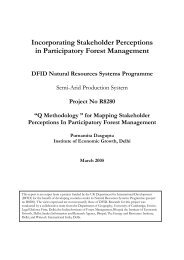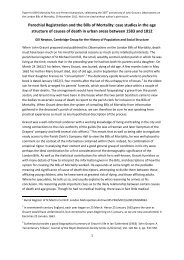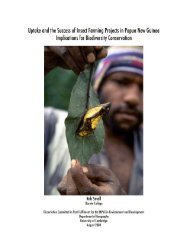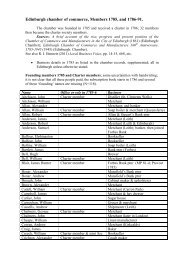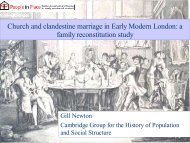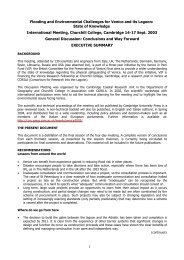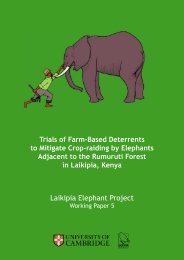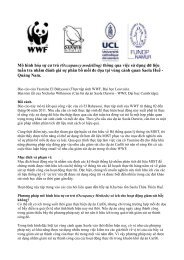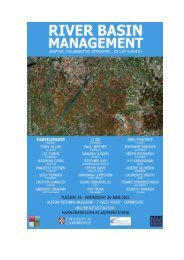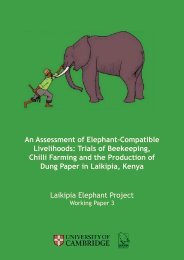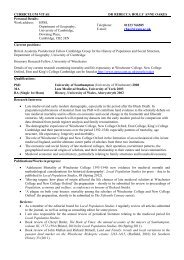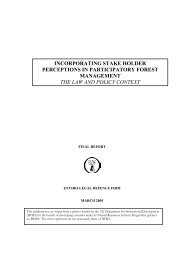Laikipia Elephant Project - University of Cambridge Department of ...
Laikipia Elephant Project - University of Cambridge Department of ...
Laikipia Elephant Project - University of Cambridge Department of ...
You also want an ePaper? Increase the reach of your titles
YUMPU automatically turns print PDFs into web optimized ePapers that Google loves.
government <strong>of</strong>ficials could watch and learn from the performance. It was also performed at the<br />
<strong>Laikipia</strong> Wildlife Forum AGM, and to a meeting <strong>of</strong> Kenyan wildlife conservationists discussing the<br />
Wildlife Bill.<br />
Table 1. HEC Play Performances<br />
Date Location Event Play Type<br />
March 2007 Nanyuki Sports Club Dress rehearsals Crop defence<br />
March 2007 Raya Primary School Parents meeting Crop defence<br />
May 2007 Mutara Labour day Crop defence Crop defence<br />
May 2007 Rumuruti Headteachers’ meeting<br />
Crop defence<br />
June 2007 Lewa Conservancy Lewa Marathon Crop defence<br />
August 2007 Kinamba Community Meeting<br />
on HEC mitigation<br />
Crop defence<br />
January 2008 Ol Maisor LWF Unit Meeting Crop defence<br />
January 2008 Sports Club Dress rehearsals Electric fence<br />
March 2008 Ex-erok Community Meeting<br />
on HEC mitigation<br />
Electric fence<br />
The location and timing <strong>of</strong> performances <strong>of</strong> the play were the result <strong>of</strong> discussions between<br />
senior project staff, local conservation partners and other stakeholders (such as District Officers).<br />
A critical element in the planning was the Community Scouts, employed by the project<br />
in local communities, to collect data on crop raiding (and latterly fence-breaking) incidents,<br />
and promote human-elephant conflict mitigation activities by local people. The scouts ‘tell the<br />
mood <strong>of</strong> the people’ to the drama group, and identify any particular problems in the area<br />
(Interviews 1 September 2009).<br />
At each performance, Community Scouts and other project staff acted as facilitators to explain<br />
and discuss critical issues at various stages <strong>of</strong> the drama. The actors are briefed before each<br />
performance on particular local issues (and characters), and are able to use this knowledge<br />
to tailor their performance in order to draw the audience into the discussion. There is a high<br />
degree <strong>of</strong> extemporization and spontaneous in-character humour and debate. Audiences are<br />
also drawn in by the actors themselves into discussions <strong>of</strong> issues <strong>of</strong> elephant, fence, family or<br />
morality.<br />
The effectiveness <strong>of</strong> drama as a conservation tool is hard to assess in a field situation, especially<br />
where (as in the case) they are performed in locations lacking all amenities, and where the<br />
audience is free to come and go (so ‘before and after’ survey methodology would be hard to<br />
use effectively). Furthermore, the play was intended to stimulate debate and discussion, and<br />
discussion with the drama group and other local partners led to the conclusion that any kind <strong>of</strong><br />
formal questionnaire-based assessment would be unhelpful. We were influenced by the ‘most<br />
significant change’ method described by Wilder and Walpole (2008), although the project lacked<br />
the staff to develop a formal MSC methodology. Instead, we interviewed two groups most concerned<br />
with the drama, the drama group itself (Box 2), and the local Community (Box 3), in an<br />
attempt to identify ‘stories <strong>of</strong> positive change’ and ‘stories <strong>of</strong> negative or unexpected change’,<br />
as described by Wilder and Walpole (2008).<br />
<strong>Laikipia</strong> <strong>Elephant</strong> <strong>Project</strong> Working Paper 4 / Page 6


